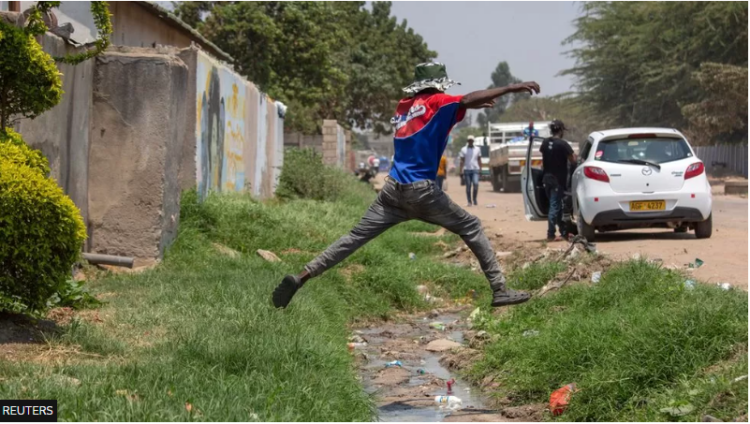Zimbabwe has declared a state of emergency in the capital Harare over a cholera outbreak.
The outbreak has so far killed dozens of people with more than 7,000 suspected cases.
The city authorities say the outbreak, spreading throughout the city, has invoked memories of a deadly outbreak in 2008, in which thousands died.
"We have declared a state of emergency because of cholera," local media quoted Mayor Ian Makone as saying.
The authorities are now asking for help to contain the spread and provide safe water, saying the aid being received is inadequate.
Health authorities have been struggling to contain the high number of admissions following the outbreak, according to the International Federation of the Red Cross (IFRC).
It cites a lack of health workers to manage the cases, as well as lack of supplies to stop the transmission.
Zimbabwe has been battling the deadly cholera outbreak in recent months amid a lack of access to clean water.
The epicentre of the latest outbreak is Harare's high-density suburb of Kuwadzana, which accounts for nearly half the reported cases, according to the authorities.
Cholera, an acute diarrhoeal infection is caused by consuming food or water contaminated with the bacterium Vibrio cholera.
On Thursday, the Harare mayor said the cholera outbreak had similarities to the 2008 outbreak.
The outbreak then led to the deaths of over 4,000 people, with at least 100,000 were infected, which led to a paralysis of basic services in the country.
This pushed then President Robert Mugabe into agreeing a historic power-sharing deal with his long-time rival, Morgan Tsvangirai.
In 2018, the country declared a state of emergency after 20 deaths and more than 2,000 cases related to typhoid and cholera were reported
"The cholera outbreak has come with vengeance," the mayor was quoted as saying on Thursday.
On Tuesday, the ministry of health announced that the country had recorded 7,398 suspected cases, 50 confirmed deaths, and 109 people in hospital.
It came as the health minister visited the epicentre, announcing measures to deal with the outbreak - including the removal of street food vendors, and trucking of safe water.
The IFRC says the disease is quickly spreading, affecting multiple geographical areas in 45 out of 62 districts and in all 10 provinces of the country.
It says the outbreak can be expected to cross the border.
Neighbouring countries including Malawi, South Africa, and Mozambique have also frequently experienced cholera outbreaks in the past.
Latest Stories
-
Students say they ‘regret’ applying to US schools after visa changes
12 minutes -
Christopher Bonsu Baah stars on Black Stars debut against Nigeria
19 minutes -
Musk ‘disappointed’ by Trump’s tax and spending bill
20 minutes -
French paedophile surgeon who abused hundreds sentenced to 20 years in jail
34 minutes -
Chelsea win UEFA Europa Conference League after comeback win over Real Betis
44 minutes -
Glacier collapse buries most of Swiss village
45 minutes -
The Case for Reparations: A focus on Ghana
52 minutes -
Nana Ampofoa Initiative tackles menstrual hygiene challenges among underprivileged female prisoners
59 minutes -
2025 Unity Cup: Black Stars to settle for third-place playoff after defeat to Nigeria
1 hour -
UHAS renamed in honour of late Prof. Atta Mills
2 hours -
Wontumi granted GH¢50m bail by EOCO
2 hours -
Access Bank and DHL forge strategic partnership to empower African SMEs in global trade
2 hours -
AUCB appoints Frank Adu as first Chancellor
2 hours -
4 nursing and midwifery unions distance themselves from GRNMA strike
2 hours -
Emmanuel Bright Quaicoe: Is AI eroding ingenuity and creativity in journalistic writing?
3 hours

